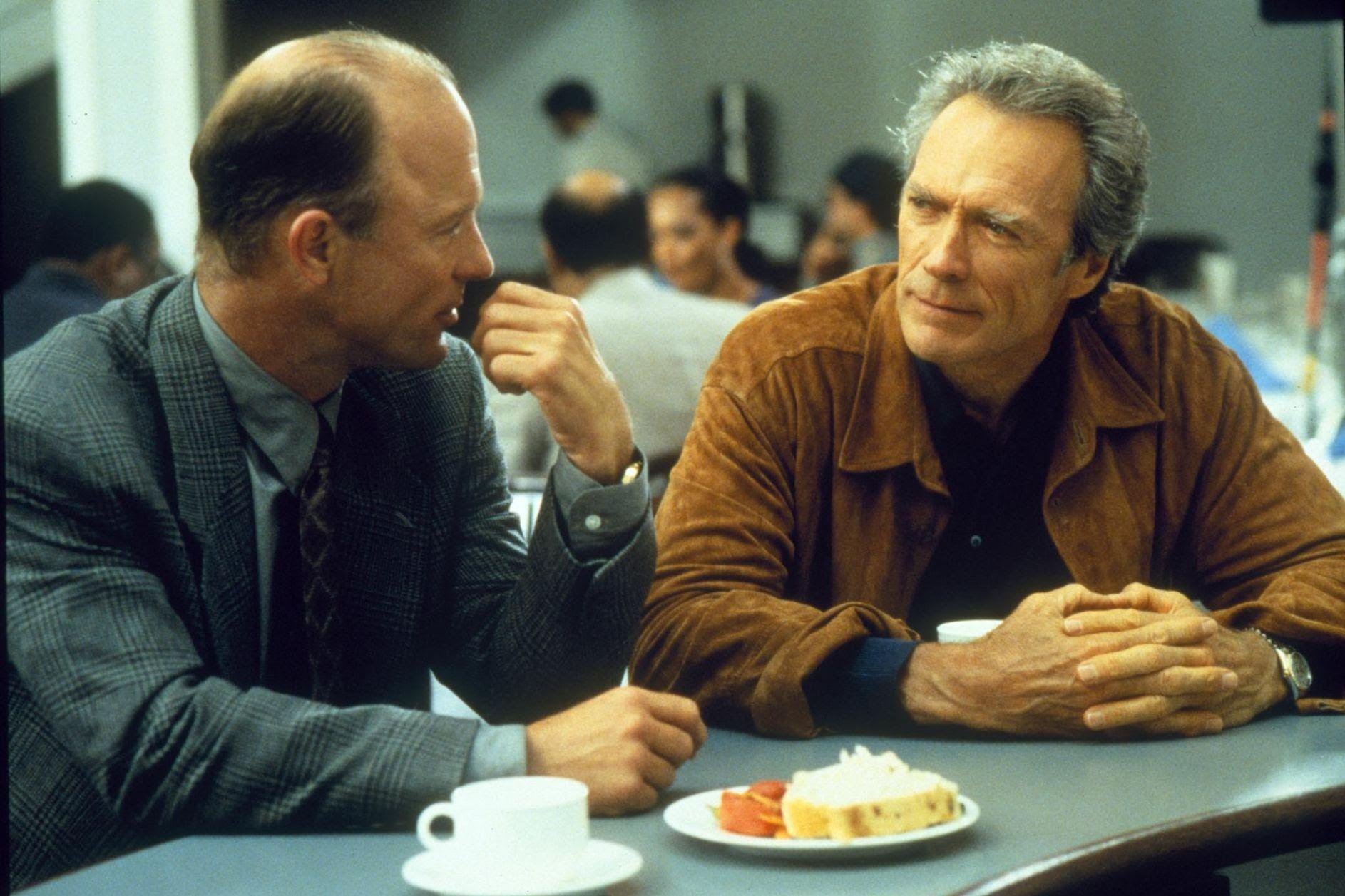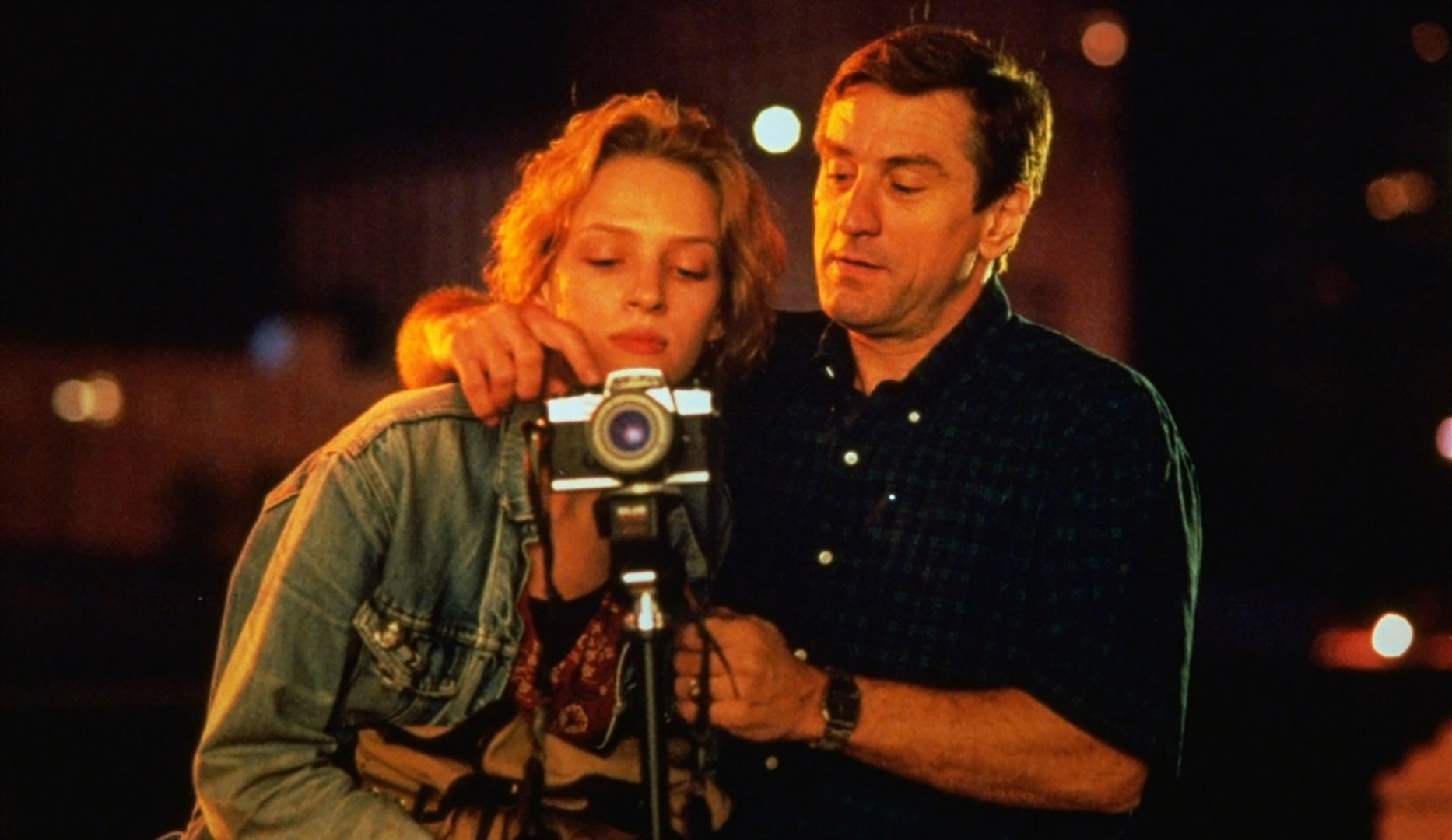6. The Hard Way (1991)

In this John Badham-directed hit, James Woods plays John Moss, a NYPD cop having to deal with both a sick killer who calls himself The Party Crasher, and a spoilt movie star called Nick Lang (Michael J Fox), who is hanging round close to Moss in preparation for a Hollywood film role.
This nostalgic, ludicrously entertaining film is worth seeing mostly for the charisma and chemistry of the two leads. Michael J. Fox was just leaving behind the iconic Back to the Future series at this stage, and was at the height of his fame. Putting him against Woods, the edgiest actor of mainstream American cinema, was a very inspired choice. They play off each other beautifully, the tension and humour bursting off the screen.
The Hard Way is, at the end of the day, a perfect star vehicle, highlighting the skills of the two leads. Woods is terrific as the tough cop who finds it hard to express himself unless it’s through anger. Here he is as intense as can be, but this time he channels that intensity for the good.
The Hard Way certainly has its fans, but I feel it gets overlooked and ignored all too often. A re-appraisal is due right about now.
7. Absolute Power (1997)

Directed by Clint Eastwood, and adapted from David Baldacci’s book by William Goldman, Absolute Power is an enthralling, compelling and consistently engaging thriller that definitely has a couple of things to say about political corruption and the true meaning of power in modern America.
Eastwood stars as veteran thief Luther Whitney, a loner estranged from his daughter, Kate (Laura Linney), whose life is his work – and his work just happens to be stealing. One night he enters the home of billionaire Walter Sullivan (EG Marshall) who is overseas on business. Accessing the secret safe behind a one way mirror, Luther is interested to see Walter’s much younger wife come in, drunk and frisky, with a man. What makes this remarkable is the fact that the man in question is President Alan Richmond (Gene Hackman). After their kissing turns aggressive, Alan loses control and begins to throttle her. She fights back, there is a struggle, and just as she is about to stab him with a letter opener, two secret service agents arrive and shoot her dead.
The president’s chief of staff, Gloria Russell (Judy Davis), arrives in a panic and begins to tidy up the mess. Removing the drunk president, she forgets to take the letter opener. Fleeing the scene through a window, Luther escapes and takes the letter opener with him. Ed Harris plays Detective Frank, the cop on the case, who has to deal with both Luther and the prying secret service. At first, Luther is going to leave the country, but when he sees the slimy president’s press conference on the TV, his hand around Walter’s shoulder, feigning devastation and sympathy, he decides he won’t be going anywhere. Though he’s facing a life threatening dilemma, Luther is adamant that justice will be served.
Though the story itself is totally unbelievable, its Hitchcockian air of sleazy intrigue ensures you are instantly pulled into its irresistible charms. From the moment we first see Luther, we like the guy. After all, he is a classic Eastwood rough diamond, not exactly a perfect gentleman but a man we can trust, someone who lives by his own code and isn’t afraid to stand up for what he believes in, however paradoxical those beliefs are.
On the flip side of the coin is Hackman, utterly sleazy as the sociopathic president, a narcissistic liar who only cares about himself and thinks not of the consequences of his actions. Hackman takes a certain glee in embodying the vicious bastard, and we really do love to hate him. Sadly, Absolute Power is not one of Eastwood’s most popular pictures. In fact, today some critics say it’s one of Clint’s low points, if not the worst film he ever directed. Many have seen it as heavy handed, ludicrously plotted, and found the obvious digs at the philandering Bill Clinton utterly distasteful. Others find it compelling and masterfully put together, me included.
8. Mad Dog and Glory (1993)

Directed by John McNaughton, Mad Dog and Glory (1993) is an under appreciated lightly comic drama with Robert De Niro as a mild mannered crime scene photographer named Wayne Dobie, who receives a gift from the gangster Frank Milo (Bill Murray) after saving his life. It just so happens that the gift in question is a woman, Glory (Uma Thurman), and pretty soon Wayne is falling for her. The only problem is, Frank wants her back and Wayne soon begins to see the truly dark side of his former friend.
The casting of Mad Dog and Glory was really quite something when you consider the recognised public personae of the two males leads at the time. Prior to this, Bill Murray had played mostly wild and off beat characters, charismatic odd balls that were not remotely villainous, and more on the plainly comic side. Seeing him as the intimidating gangster, things are immediately turned on their head and Murray makes for a surprisingly sinister figure.
It was a distinct turning point for Murray in fact, when he really showed he could surprise the viewer with something fresh, unexpected and totally engaging, the very same year he made the immortal Groundhog Day. The problem was that not many people saw him displaying such versatility. De Niro played against type too, his shy and retiring Wayne being among his finest performances from the 1990s.
I hope that Mad Dog and Glory goes on to get more acclaim as time goes by, as it’s a great film. It did get good reviews at the time, but seemed to fade away quite quickly and did little at the box office. A wonderful little comedy drama that deserves more appreciation.
9. Diabolique (1996)

The Hollywood remake is a murky and often controversial subject. The 1990s were certainly the decade when the dreaded remake really started to rear its head and it seemed that almost every other film was a remake of either an old classic or a foreign hit. One really interesting, yet vastly underrated “reimagining” came in 1996 with Sharon Stone and Isabelle Adjani starring in the moody and genuinely thrilling remake of the 1955 French classic Les Diaboliques. With a script by Single White Female writer Dan Roos, co-credited with the first film’s original director Henri-Georges Clouzot and Jeremiah S Chechnik behind the camera, it all gels together nicely; a perfect blend of mystery, twists and simmering tension.
Chazz Palminteri plays Guy Baran, a nasty head teacher married to the meek Mia (Adjani) but also having an affair with fellow teacher Nicole (Stone). After getting together to plot his murder, they act it out with apparent success and dump his corpse. Strangely, the body vanishes and with cop Shirley Vogel (Kathy Bates) on the case, things become tense, especially when Guy is spotted walking around and various clues are left around the school that hint towards the fact that someone has been watching them; or indeed that Guy is alive and well.
Most cinema buffs will know of the original film and its classic moment where the “murdered” rises from the bathtub. It’s a truly chilling scene and in this updated version it’s similarly haunting, although the fact it’s in colour and not black and white does soften the creepiness a little. There are some terrifically filmed sequences and genuinely exciting moments where you are on the edge of your seat. A completely different entity to the 1955 original, comparing the two is kind of pointless. You may prefer the original, but had you not seen the 55 version, you would still enjoy this one and be along for the ride.
Adjani gives a wonderful mouse like portrayal of the put upon wife who has had enough, perfectly embodying the desperation of a woman who feels she has no options left. Palminteri is fantastic too, nailing the nasty bastard to a tee. Stone herself gives what I feel to be the film’s best and perhaps most multi layered performance. Stone can be calm and collected one minute, then a complete bag of nerves the next. She gives a brilliant effort, perfectly measured and balanced, reflecting the situation she is in. In her outrageous comic book costumes, she looks great too, smoking endless cigarettes and constantly ensuring they have their stories straight. Of course, like all good femme fatales, she isn’t at all what she seems.
Unfortunately, Diabolique was a massive flop, both critically and at the box office. With a large budget of 45 million, it only managed to claw back 17. This loss may have had something to do with the critics, who it has to be said, ripped the film apart. Remaking such a beloved classic was a bad idea in some respects and with film critics holding the original so dearly, it was only ever going to get bad notices. In effect, they killed the picture stone dead. Now the fuss has died down, Diabolique is definitely worth a reinvestigation.
10. Blood and Wine (1996)

Bob Rafelson’s Blood and Wine seems largely forgotten today, but anyone fond of seedy 90s flicks should seek it out. The film concerns a wine merchant in Miami, played by Jack Nicholson, scheming to steal a diamond necklace from the home of a customer. Jack plays the nasty Alex Gates wonderfully, in a genuinely thrilling turn. That said, Michael Caine probably steals it as the greasy safe cracker Victor, Alex’s closest friend in the sleazy world he inhabits, and the pair make a brilliant duo.
It seems a shame that the film containing Jack’s smartest performance of this period was such a flop. While it didn’t have the intelligence of earlier Nicholson/Rafelson team ups (Five Easy Pieces and The King of Marvin Gardens were two of the subtlest and most enjoyable films of that time), it was a mucky delight from start to finish. And Rafelson, known to most at this point for making complex, subtle dramas, melancholic explorations into the human soul, proved he could out-genre the proven masters of the thriller. He employs some of the language of the thriller, but he avoids cliches, and ensures that emphasis is not on action and ludicrous plot twists, but the nature of man, the darkest reaches of the soul, and what people will do for money.
Violent, sweary, sweaty and seedy as can be, the people in Blood and Wine have no redeeming qualities, yet Rafelson keeps us hooked until the very bitter end and ensures we remain fully engaged and enthralled. Largely unavailable these days, this buried gem deserves much more.